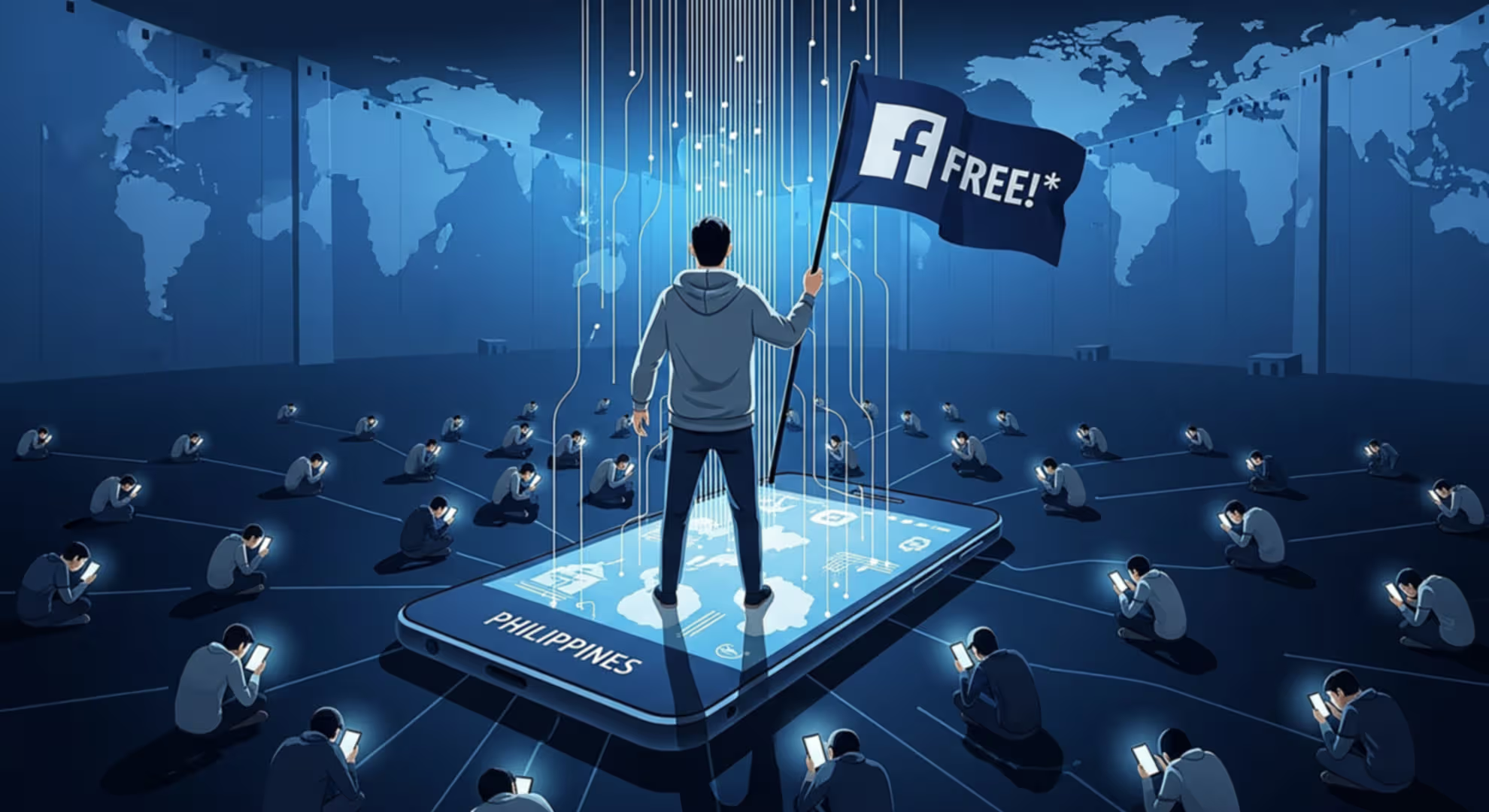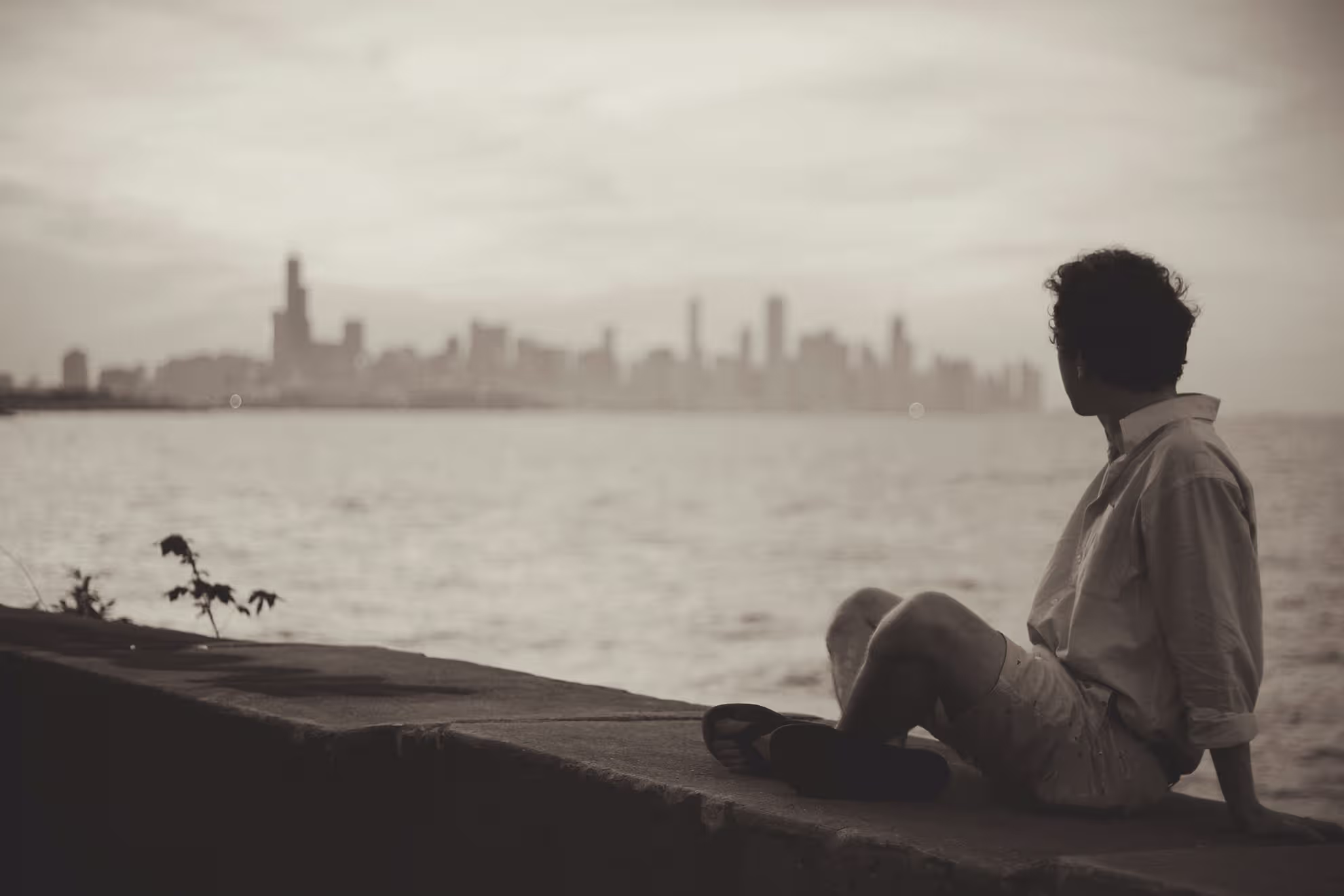Welcome to the Matrix, Pinoy Edition
Remember when the internet was supposed to liberate us? That beautiful 90s dream was twisted into a digital prison, and the Philippines became one of the preferred testing grounds. The harsh reality is that we walked into it with our eyes wide shut.
It wasn’t mere dominance of the Philippine internet. It was colonization, plain and simple. The takeover was so seamless that many Filipinos still believe they were being given a gift.
The Great Digital Bamboozle of 2013
Let’s rewind to where this corporate disaster began. In 2013, Facebook rolled out “Free Basics” in the Philippines through Globe Telecom. At first glance it looked charitable, but it was nothing of the sort. This was not a benevolent attempt to connect the poor; it was a calculated strategy to establish what academics now describe as “digital colonialism.” 1 2
Free Basics gave Filipinos “free” access to Facebook and a handful of pre‑selected websites. The catch was that everything else on the internet required payment, and most Filipinos simply could not afford it. Over time, millions came to equate “the internet” with a single platform, trapped inside Facebook’s walled garden. 3
Academic research from the University of Michigan defines digital colonialism as “a modern-day ‘Scramble for Africa’ where large-scale tech companies extract, analyze, and own user data for profit and market control”. Sound familiar? That’s exactly what happened to us. 1
The “Walled Garden” Manipulation
Here’s where it becomes truly insidious. Facebook created what scholars call a “walled garden,” a limited and curated space that users mistook for the entire internet. When Filipinos on Free Basics saw news headlines in their feed, they could read the headline but had to pay for data if they wanted to click through to the full article. 4
Translation: Filipinos got used to making decisions based on headlines and Facebook posts instead of actual journalism. Does that sound like a recipe for misinformation? You bet it is.
Dr. Lucy Pei from UC San Diego put it perfectly in her 2021 research: Facebook turned the Philippines into its “market, testbed, and backroom”. We became guinea pigs for Facebook’s social experiments while they extracted billions in data and ad revenue. 5
The Body Count
Let’s talk about the real consequences. Meta’s own human rights assessment, released only after relentless public pressure, admits that its platforms became weapons of “incitement to violence” during Duterte’s regime. Government officials used Facebook to broadcast threats against human rights defenders, and 167 people who were “red‑tagged” ended up dead after being singled out on the platform. 3
Meta’s response? They were “too slow to respond” and failed to properly staff their Philippines operations.
Translation: Filipino lives were expendable as long as the user engagement kept flowing. 3
Maria Ressa, the Nobel Prize-winning journalist who initially partnered with Facebook on their “connectivity” initiatives, became one of their harshest critics after witnessing “years of large-scale algorithm-powered spread of disinformation”. Even Facebook’s former allies couldn’t stomach what the platform had become. 6
The Economic Stranglehold
By 2025, the numbers tell the full horror story:
- Filipinos spend 10+ hours daily on social media which is twice the global average 3
- 78% use social media for commerce discovery instead of independent websites 7
- Most Filipinos trust social media more than traditional news sources 3
Meta’s Free Basics program created what their own assessment calls a “closed information environment” where leaving the platform literally costs money. That’s not market competition but economic coercion. 3
The Academic Receipts
This isn’t some conspiracy theory from a disgruntled 90’s kid. Serious academic institutions are calling this out:
Boston Review (2025) documents how Facebook’s aggressive promotion of “free” access initiatives accelerated online disinformation in both Myanmar and the Philippines. The pattern is clear: Facebook enters developing markets with “charitable” programs, creates dependency, then prioritizes profit over local welfare. 6
Stanford University research shows that Facebook allocated 84% of its misinformation budget to the United States despite Americans representing less than 10% of platform users. Filipino lives apparently weren’t worth the investment in content moderation. 6
University of Michigan Law Review (2019) identifies four key actors in digital colonialism, and Filipinos are stuck at the bottom as “citizens who unknowingly act as data sources” and “target groups” for Western corporate agendas. 1
Facebook’s Global Digital Empire
Facebook’s Free Basics was a massive global operation that targeted developing nations across multiple continents. It was designed to lock entire populations within the platform:
The Complete List of Facebook’s Victims
Africa (30+ countries targeted): Stanford research shows 30 African nations with Free Basics, treating the entire continent as a digital testing ground. 8
Asia-Pacific Region:
- Philippines (2013-ongoing)
- Indonesia (early adopter, 2014+)
- India (launched 2015, banned in 2016 after massive resistance)
Latin America and Other Regions: According to Facebook’s own documentation, Free Basics expanded to 65 countries by 2019, though they don’t publicly list all targets because, you know, admitting to digital colonialism isn’t great PR. 8 9
India: The One That Got Away
India is the hero story in this nightmare. After Free Basics launched in 2015, Indian digital rights activists, tech entrepreneurs, and even Bollywood celebrities mounted massive resistance. The Telecom Regulatory Authority of India banned Free Basics in February 2016, ruling it violated net neutrality. 10
The Wall Street Journal reported that Facebook faced “backlash” in both India and Indonesia, but only India had the political will to fight back. India proved it was possible to resist Facebook’s manipulation. 11
Africa: The Biggest Target
The Stanford research is particularly damning about Africa: 30 countries got hit with Free Basics, and Facebook specifically chose “economically disadvantaged populations” as targets. Academic analysis shows this wasn’t charity – it was “data extraction from vulnerable populations” designed to capture entire markets before local alternatives could develop. 8
The Pattern is Clear
Facebook’s strategy was simple:
- Target developing nations with limited internet infrastructure
- Partner with local telecom monopolies (like Globe in PH)
- Create artificial scarcity; Facebook is free while everything else costs money
- Extract data and ad revenue while controlling information flows
65 countries fell for this scam and only India fought back successfully. The rest of us are still trapped, while wondering why our internet feels so rigged.
The 90’s Dream vs. The Digital Nightmare
Those of us who remember the early internet know what we lost. We had bulletin boards, independent websites, open protocols and the promise that information wanted to be free. We believed technology would democratize knowledge and level-playing fields.
Instead, we got digital feudalism where Filipino entrepreneurs can’t build real businesses without paying tribute to social media algorithm gods. We have a platform where our elders form their political opinions from fabricated memes engineered for engagement, while bad actors exploit the algorithms to get famous by amplifying outrage, fear, and sensationalism.
The Ultimate Insult
The worst part? Facebook rebranded Free Basics as “Discover” in 2020, claiming it now “treats all websites equally”. Too late. Two generations of Filipinos see Facebook as the internet. The digital colonization was complete. 3
Contemporary research shows that Facebook’s new “Discover” app still renders Facebook and Instagram “with their features nearly intact” while other websites become “broken or difficult to use”. Same scam, different packaging. 12
Wake Up
This is what digital colonialism looks like in 2025. It’s not soldiers and gunboats; it is “free” internet that isn’t free, algorithms that decide what information you see, and entire economies held hostage by Silicon Valley sociopaths who view human suffering as acceptable collateral damage for user growth metrics.
The Philippines and Indonesia weren’t unique victims. We were part of a systematic global assault on digital independence. Facebook just got away with it because most developing nations lacked India’s combination of tech expertise, political will, and organized resistance.
We can’t change what already happened, but we can at least acknowledge the truth: the Philippines became Facebook’s digital plantation and we’re working the fields. The question isn’t whether we can escape. The real question is whether we’ll at least admit we’re trapped in it.
Bottom line: Facebook colonized most of the developing world’s internet, and we’re all paying the price.
References
1. Digital Colonialism: The 21st Century Scramble for Africa through the Extraction and Control of User Data and the Limitations of Data Protection Laws – Michigan Journal of Race and Law ↵
2. Internet.Org is now Facebook Free Basics, partners with Globe in the PH – Adobo Magazine ↵
3. Assessing the Human Rights Impact of Meta’s Platforms in the Philippines (Executive Summary) – Meta / Article One ↵
4. Big Brother’s Grand Plan: A Look at the Digital Security Playbook in the Philippines – Civic Futures ↵
5. Market, Testbed, Backroom: The Redacted Internet of Facebook’s Discover – ACM Digital Library ↵
6. How to Fight Digital Colonialism – Boston Review ↵
7. Social Media Statistics in the Philippines – Meltwater ↵
8. Digital Colonialism: Toussaint Paper – Stanford PACS ↵
9. Internet.org – Wikipedia ↵
10. Facebook’s Free Basics, Net Neutrality, and Public Broadband Internet – Dissent Magazine ↵
11. Facebook’s Free Internet Access Program in Developing Countries Provokes Backlash – Wall Street Journal ↵
12. Facebook Discover Internet App Study in the Philippines – Engadget ↵



